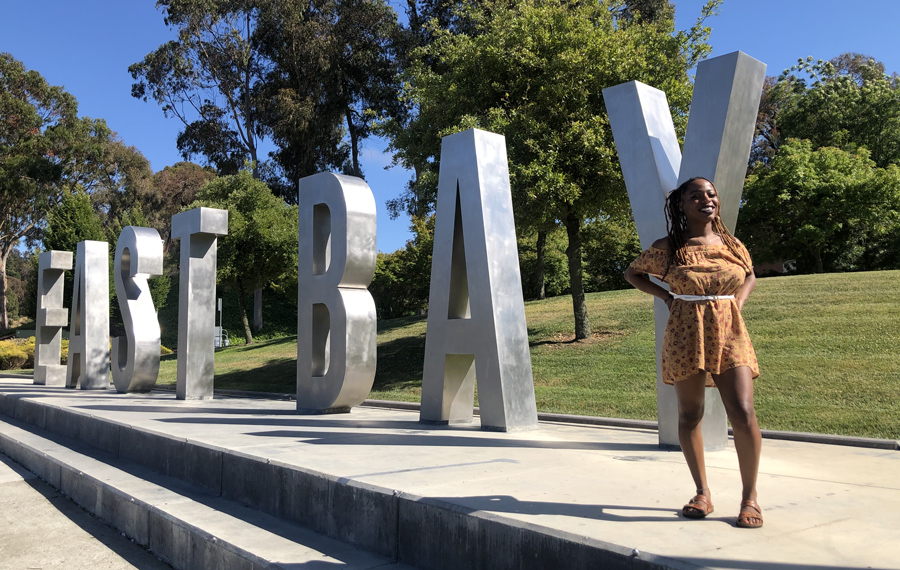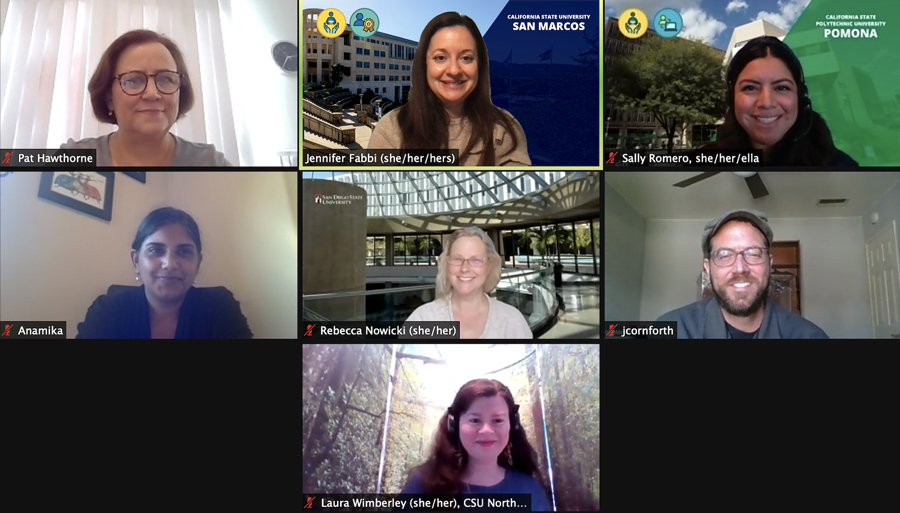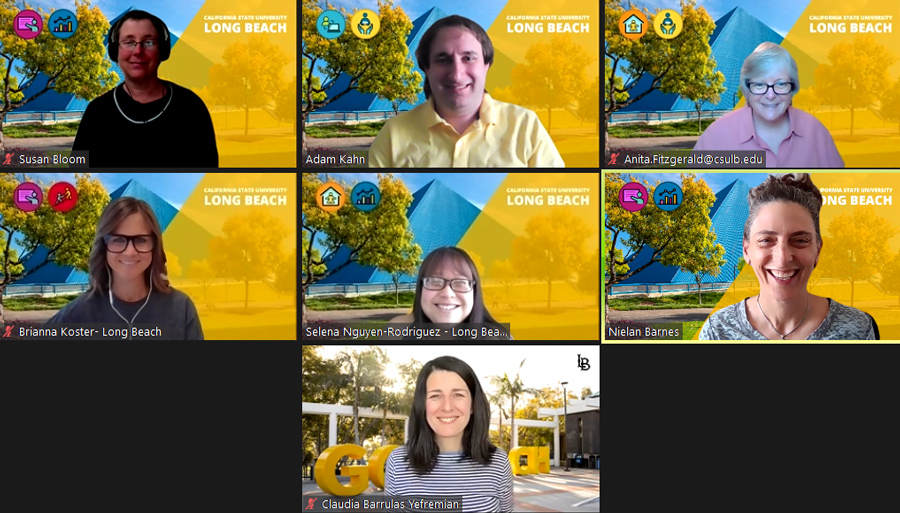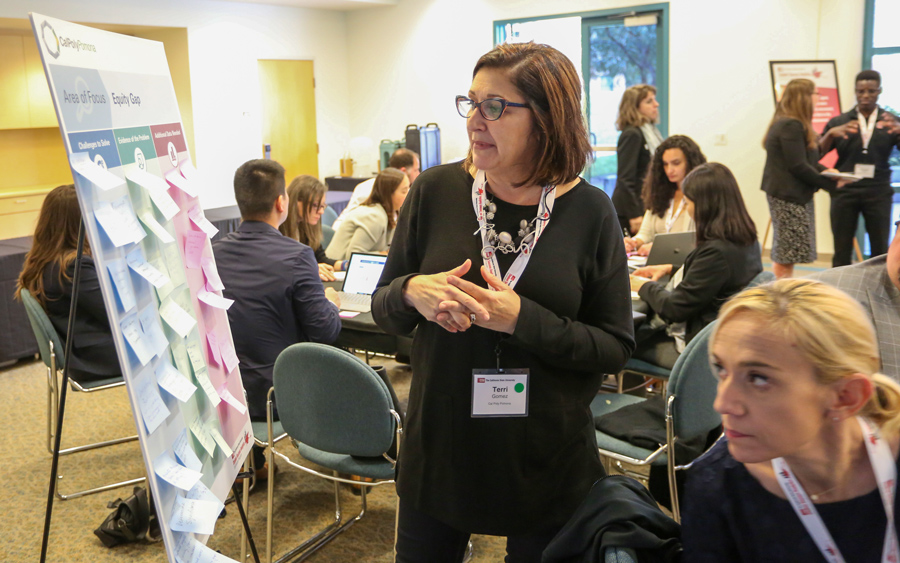focus on the positive
California State University, East Bay has been participating in the Analytics Certificate Program since the pilot in 2018. Several campus teams have embarked on actionable projects inspired by the program and aligned with GI2025 goals and student success.
“It provides an avenue to uplift and empower faculty and staff to be able to [advocate] on behalf of our students," says Fanny Yeung, Ph.D., director of Institutional Effectiveness and Research. “Now we can talk about our concerns and what our students need, and they know how to look at those data resources."
One such project, the
Black Excellence Project, grew out of data showing lower graduation rates among Black students. As a way to address the issue, the project leads produced a series of videos showcasing the experiences and celebrating the graduation success stories of Black students at CSUEB.

Project leads Steven Cleveland and Sarah Aubert donned face masks for their Black Excellence Project campaign.
“The goal is to amplify their voices, to share their stories, to highlight the best practices on our campus that worked for them and what didn't work or what challenges they faced during their time here," explains Sarah Aubert, university curriculum coordinator/catalog, curriculum specialist and project co-lead.
“We have a personal connection to the story as first-gen Black students ourselves, having dealt with the challenges that come with that and having achieved a success in our own ways," she adds. “We know it's possible [to graduate] and there must be an avenue for our students to achieve that as well."
The social media campaign focuses on freshmen who graduated in four years and transfer students who graduated in two years.

Bidemi Animashaun, fall '20, shared her story as a first-generation college graduate for the Black Excellence Project. "Education is the gateway to everything you want in life. … I wouldn’t have picked anywhere else to go for my undergrad."
“We often look at the challenges [Black students] are facing, and we share stories that highlight deficits toward the end of trying to fix those challenges," says Steven Cleveland, filmmaker, CSUEB lecturer and fellow project lead. “To me, the strength-based approach allows us to celebrate excellence, to celebrate folks who are exceptional, as opposed to highlighting those who are struggling."
The hope is the campaign will help CSUEB—as well as other institutions—implement changes and best practices based on the students' stories to minimize the graduation equity gaps affecting Black students.
multi-campus effort
“The program was so focused on social justice and closing the equity gap; there's a lot of like-mindedness there when it comes to libraries in terms of access to information and information literacy."
—Dr. Jennifer Fabbi
With members from eight campuses, the
Council of Library Deans' Student Success Committee became the first multi-campus team to join the program. Their participation resulted in the development of a preliminary report analyzing the impact of low- and no-cost courses and materials on course passing rates.
The idea grew from the librarians' work with the systemwide
Affordable Learning Solutions (AL$) program, which awards campuses funding to introduce faculty to alternative materials that could lower students' costs. The initiative has led to an increase in the number of low- and no-cost courses.
“The AL$ program allows our libraries to do this work because it funds and has funded for many years the acceleration of adoption of low- and no-cost course materials," says Jennifer Fabbi, Ph.D., dean of the university library at
California State University San Marcos and committee chair. “This study can then feed back into the program to show the efficacy of these practices."

Due to the COVID-19 pandemic, the Council of Library Deans’ Student Success Committee participated virtually in the spring 2021 session of the Analytics Certificate Program.
Some ways libraries reduce course costs are through purchased course reserves that can be pulled together into class readings, unlimited licenses for electronic materials and Open Education Resources. By lowering the cost of materials, students have greater access to a more affordable and equitable learning experience.
“To be successful, you have to do the reading, and to do the reading, you have to have access to the reading," Dr. Fabbi says. “But there are students who for one reason or another make the choice not to purchase their course materials because the cost can be very high."
The team was able to identify relevant course data from fall 2020 for five of the represented campuses—California State University Channel Islands,
California State University, Fullerton,
California State University, Los Angeles,
California State University, Northridge and CSU San Marcos—and found low- or no-cost courses had a significant effect on course passing rates. However, the team plans to conduct further analysis and produce a full study once classes have returned to a more traditional format following the pandemic.
learning from the CSU
The Analytics Certificate Program is also contributing to student success at other higher education institutions. University of Northern Colorado (UNC), which participated in the program for two consecutive years, is just one of the non-CSU universities that have been able to apply program learnings to close equity gaps on their own campuses.
“It was a positive for our faculty who participated to have that experience of doing something that benefits the entire institution," says Kim Black, Ph.D., UNC assistant provost for Academic Effectiveness and team lead. “Their exposure to all of the webinars and seeing how other institutions are using data helped to create a core of people on campus who can be involved in future student success work."
UNC's first team used the experience to analyze whether course scheduling impacted student retention—a project conducted by graduate-level statistics students that found it didn't have much of an effect. Building on this foundation, the second cohort worked on two projects: identifying additional data that would serve the academic program review process and building student success data dashboards, including one on students' sense of belonging.
“Having access to the data in that format and with the equity gap focus ... opened up some new opportunities for our faculty to help us think about what kind of data would be most useful for academic departments to have when they're making decisions about how to improve student success within their own majors," Dr. Black says.
The teams hope to develop a UNC professional development program like the CSU's certificate program to train faculty and staff on using data to close equity gaps.
self-reflection
While Associate Professor of Psychology Sharon Furtak, Ph.D., completed the program with a
California State University, Sacramento team studying student drop-off rates between undergraduate and graduate programs, she was able to further apply her learnings to another endeavor.
Using the data, Dr. Furtak started looking at equity gaps in her department and found about a third of psychology majors, most of whom were Pell-receiving or historically underserved students, left the campus within four years. In addition, she saw nine percent of students who took the course Navigating Psychology—a one-unit class required for all psychology majors—received a D grade or lower, which jumped to 14 percent for the spring 2020 semester when COVID-19 hit.
“It is set up to be one of the first classes students have in the major, and it should also be one of their first interactions with our faculty," Furtak says. “It's a great opportunity to create an environment where they believe they can thrive, but also where they feel like they're coming into a supportive network of faculty who want to help them succeed."

Dr. Sharon Furtak, second from right, cheers with her Sacramento State team at the 2020 Kickoff Session. Her team transitioned to a fully virtual format mid-semester due to the COVID-19 pandemic.
Ahead of teaching the course for the first time in fall 2020, she redesigned the class to increase the students' sense of belonging. Changes included representing the campus as a diverse and welcoming place, making sure the students were represented in the class, sharing her own successes and setbacks, embedding a segment on cultural awareness tied to the university's anti-racist convocation, increasing accessibility and reaching out to students who were struggling.
“Every single piece I tried to build in a way that was accessible, was community-based and created a sense of belonging," she says.
That semester, 215 students enrolled in the course and the rate of students receiving a D or lower was only 3.6 percent.
“As I [work] to excel in supporting student success, I am regularly coming back [to the data] and looking at where our students are struggling and where there are equity gaps that could be addressed—and constantly using that to inform how to improve my classes," Furtak says.
share the wealth
“There was certainly a profoundly empowering aspect that having access to this data gave me in terms of my own courses, interacting with other faculty, doing program review and within other contexts.”
—Dr. Nielan Barnes
After going through the certificate program in spring 2021, Adam Kahn, Ph.D., assistant professor of communication studies, and Nielan Barnes, Ph.D., professor of sociology, piloted workshops for their College of Liberal Arts at Cal State Long Beach on equitizing course syllabi to facilitate student success. They blended lessons from the CSU Analytics Certificate Program on using the student success data to make data-driven decisions on equity with takeaways from a Long Beach City College (LBCC) cultural curriculum audit course on embedding equity-minded practices into teaching.
“The data helps you identify problems or identify areas of focus … [and] the curriculum audit, while it didn't necessarily help you identify the problems, provided you lots of solutions," Dr. Kahn says.

Dr. Adam Kahn and Dr. Nielan Barnes meet virtually with their CSULB program team.
Dr. Barnes adds: “We identify the problem a lot of times, and we know students aren't doing well in our courses. We have an idea of who some of those students are. But when you look at the data, it's powerful visually, as well as numerically and statistically, in letting you know who the students are, where they are struggling and where they are doing well."
The goal is to expand to other colleges at CSULB and include the program team members from those colleges in building out the workshops.
“We see a workshop series that includes not just equitizing your syllabus, but using the data to do things like build effective communication strategies, build effective online content (for example, your course homepage) and build transparent and effective assessments," Barnes says. “So much of the equity work I see happening now is very conceptual, theoretical and—while there are applications—often not very data-driven. That I think is the kind of thing we want to highlight: how we're using data to drive equity-minded interventions."
culture shift
“We want faculty involved in this [program]," says S. Terri Gomez, Ph.D.,
California State Polytechnic University, Pomona associate provost of Student Success, Equity & Innovation. “It is important that they, too, have access to this professional development opportunity to learn more about student success analytics."
For this reason, a number of CPP faculty and staff have completed the program to work on equity-focused projects. One project sought to bring about a culture change after the campus switched from quarters to semesters and began encouraging students to complete 30 credits each year. Some campus staff were concerned the resulting course loads would undermine first-generation, underrepresented and Pell-eligible students' success.

During the spring 2019 program session, Dr. S. Terri Gomez brainstorms solutions to equity gaps at Cal Poly Pomona with her team.
After increasing the percentage of students completing 30 units each year from 25 percent to 63 percent over the course of two years, a team joined the certificate program to see how the change affected student success by looking at data by college, major, gender, race, ethnicity and GPA. The analysis showed year-to-year retention was higher and GPAs increased, with students who had a 3.0 GPA and below seeing the most significant benefit. Eventually, the analysis will also look at graduation data.
“Part of the strategy was not just to put students in any 15 units, but to be intentional in working with the advisors so we made sure they were in a schedule that was leading to timely graduation," Dr. Gomez says. “We've been able to get much more sophisticated in our analysis and build a culture on campus that begins to embrace the idea that all students can perform well if we set high expectations but offer the support they need to be successful."
Register for the CSU Certificate Program in Student Success Analytics, and read more about how it has helped address equity gaps at the CSU.